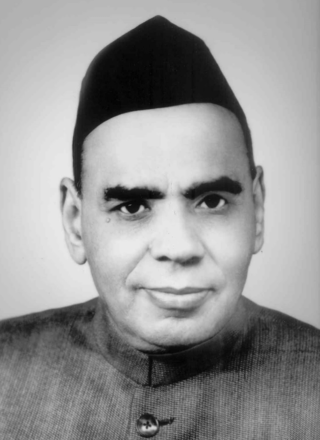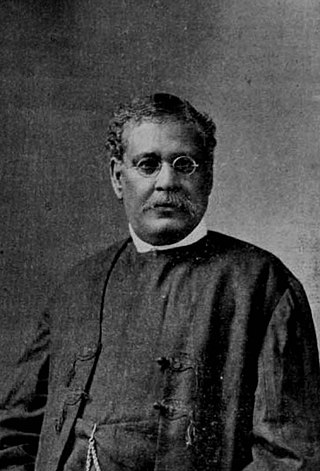
The Most Eminent Order of the Indian Empire is an order of chivalry founded by Queen Victoria on 1 January 1878. The Order includes members of three classes:
- Knight Grand Commander (GCIE)
- Knight Commander (KCIE)
- Companion (CIE)
Sir Charles James Lyall was a British Arabic scholar, and civil servant working in India during the period of the British Raj.

Sir Charles Alexander Innes was a British civil servant and colonial administrator who served as Governor of the British Crown Colony of Burma from December 1927 to December 1932. He was also formerly chairman of the Mercantile Bank of India.

Sir Chandulal Madhavlal Trivedi KCSI, CIE, OBE, ICS was an Indian administrator and civil servant who served as the first Indian governor of the state of Punjab after Independence in 1947. He subsequently served as the first Governor of Andhra Pradesh from its creation in 1953 until 1957.

Sir Rashbehari Ghosh was an Indian politician, lawyer, social worker and philanthropist.
Sir Murray Love Hammick, was an Indian civil servant and administrator who acted as the Governor of Madras from 30 March 1912 to 30 October 1912.
The Diamond Jubilee Honours for the British Empire were announced on 22 June 1897 to celebrate the Diamond Jubilee of Queen Victoria on 20 June 1897.
Sir Bhupendra Nath Mitra was an Indian government official and diplomat who served as the third Indian High Commissioner to the United Kingdom from 1931 to 1936.
Sir William Stevenson Meyer was an Indian Civil Service officer. From 1920 until his death two years later, he served as the first High Commissioner for India.
The New Year Honours 1922 were appointments by King George V to various orders and honours to reward and highlight good works by members of the British Empire. They were published on 30 December 1921.
The New Year Honours 1921 were appointments by King George V to various orders and honours to reward and highlight good works by members of the British Empire. They were published on 31 December 1920.
The 1928 New Year Honours were appointments by King George V to various orders and honours to reward and highlight good works by citizens of the United Kingdom and British Empire. They were announced on 30 December 1927.
The 1892 Birthday Honours were appointments by Queen Victoria to various orders and honours to reward and highlight good works by citizens of the British Empire. The appointments were made to celebrate the official birthday of The Queen, and were published in the London Gazette on 24 May 1892 and in The Times on 25 May 1892.
The 1921 Birthday Honours were appointments by King George V to various orders and honours to reward and highlight good works by citizens of the British Empire. The appointments were made to celebrate the official birthday of the King, and were published on 3 and 4 June 1921.
The New Year Honours 1903, announced at the time as the Durbar Honours, were appointments to various orders and honours of the United Kingdom and British India. The list was announced on the day of the 1903 Delhi Durbar held to celebrate the succession of King Edward VII and Queen Alexandra as Emperor and Empress of India. The membership of the two Indian Orders were expanded to allow for all the new appointments.

Sir Stanley Ismay, was a British civil servant and judge in British India, where he spent most of his career in the Central Provinces, acting as Chief Commissioner in 1906. After resigning from the civil service, he was a member of the Imperial Legislative Council 1905–1908, and Chief Judge of the Chief Court of Mysore from 1908 to 1912.
Sir Henry Wheeler, was the Governor of Bihar and Orissa from 12 April 1922 to 6 April 1927. He was a member of the Imperial Civil Service appointed in 1889 and served in Bengal. He was also a member of Council of India from 1927 to 1937.
SirJames David Sifton, KCSI, KCIE was a British civil servant who was the Governor of Bihar and Orissa from 7 April 1932 to 31 March 1936 and then Governor of Bihar from 1 April 1936 to 10 March 1937. He was the first Governor of Bihar after division of province from Orissa. He was a member of the Imperial Civil Service appointed in 1902 and served in Bengal and later in Bihar and Orissa Province.
Sir Charles Stuart Bayley, GCIE, KCSI, ISO was a British colonial administrator in India.





